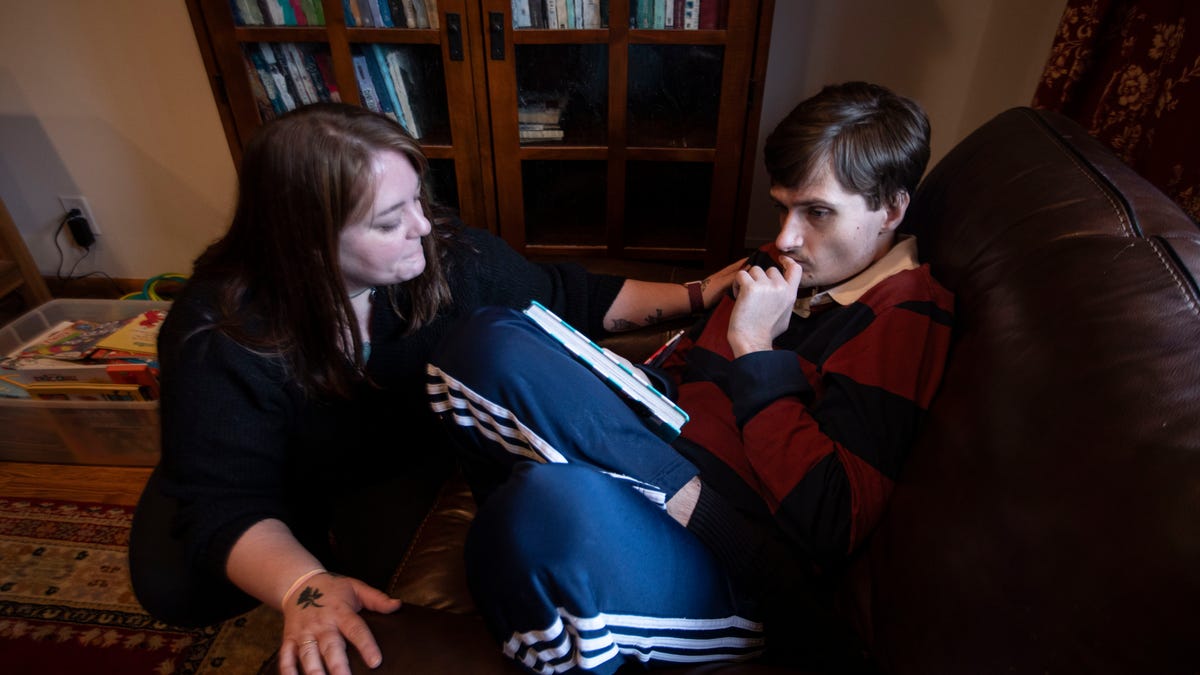Should a NY library ban a man with autism from children’s room? This petition says no According to CDC data,1 in 36 kids and 1 in 45 adults in the U.S. has autism. The library’s website includes regulations for the children’s room, which state programs are for children age 12 and under and those accompanying a child. Dan Maillet, whose 31-year-old son has autism, said the rules should consider more than just numbers. “It’s not their physical age, it’s their mental age. As long as they have aides with them.” IRVINGTON − Matt Maillet loves books. He loves music. And he loves libraries. At age 31 with dual developmental disabilities, autism and Prader-Willi Syndrome, Matt goes with his caregiver or parents to local libraries for children’s programs. A favorite has been the West Harrison Library. Their activities provide him entertainment and socialization opportunities. But Kayla Brown, who supports Matt, said during a recent visit to the children’s room at West Harrison, she was told Matt could not be in that area. A librarian said he would need to be in the adult section, and the library would provide children’s books for him to browse there. This and similar age-restriction issues are likely to be faced by more families. One out of 36 children and 1 in 45 adults in the U.S. has autism, according to the U.S. Centers for Disease Control and Prevention. Daniel Maillet, Matt’s dad, called the restriction unacceptable. “I called the director and explained the issues,” he said, adding that West Harrison has wonderful kids programs. But he said the librarian didn’t budge. “It was abrupt and it was callous.” A change.org petition seeking support for Matt and other adults with disabilities, posted by Brown, was approaching 200 signatures by Wednesday. “We feel that the rules should be carefully changed to allow IDD disabled individuals with close monitoring by an aide to be able to participate,” the petition states. What library rules say Harrison Library Director Galina Chernykh and Harrison Library board President Andrea Mignone Viehe-Naess declined to comment about the situation, citing patron privacy. However, in communication about the issue with Barbara Mahoney, an Irvington neighbor of the Maillets, Chernykh said that the library offered adult programs that are designed to be inclusive and accessible. “Your understanding in this matter is greatly appreciated as we navigate the delicate balance between inclusivity and adherence to policy,” Chernykh wrote in a March 5 email. West Harrison is a branch of the Harrison Public Library. According to the library’s website, children’s room regulations specify that the room and programs are for children ages 12 and under and those accompanying a child; someone accessing material only available in the children’s room; or someone developing curricula or researching children’s literature. “All other patrons must only use the other areas of the Library,” the website states. The children’s room rules acknowledge that children, “by nature can cause some disruption.” There are no restrictions for attending library events. “However, children (whether with a caregiver or not) who are deemed too disruptive by the Library staff will be warned that if they do not settle down they will be asked to leave the Library. Extreme or repetitive disruptive behavior, in the sole judgment of the Library staff, may result in immediate expulsion from the Library.” Peter Zummo, a retired lawyer in Erie County and a parent of a 25-year-old with autism, said the legal and practical questions are not necessarily the same. “If the rule is enforced across the board, it may be legal. Segregating by age is not inherently illegal,” said Zummo, who serves on the executive committee of the New York Alliance for the Developmentally Disabled. “But it’s not a good look.” ‘He’s such a sweet guy’ Matt Maillet is nonverbal and has limited communication skills. He likes to thumb through picture books and is especially partial to Elmo. He’s attended various children’s programs at his church, St. Barnabas Episcopal in Irvington. The Maillets have arranged one-on-one support for Matt through the Self-Direction program, facilitated by the state Office for People with Developmental Disabilities. Prior to the COVID pandemic, Matt had participated in day programs, but the Maillets said the one-on-one support works best for their son. Brown, a former nanny, started working with Matt this year. She said library visits help keep Matt engaged, especially in the winter, when outdoor activities are limited. She was unaware of any families complaining about Matt’s presence in the children’s room. “He’s such a sweet guy.” Dan Maillet said that the library rules should consider more than just chronological age. “It’s not their physical age, it’s their mental age. As long as they have aides with them.” Dan Maillet said even if nothing changes at the library, he hopes Matt’s circumstance will start a discussion about the needs and comfort of those with developmental disabilities. “I’ve been advocating for 30 years,” Dan Maillet said. “If something’s not right, I call it out.” Nancy Cutler writes about People & Policy for lohud.com and the USA Today Network New York. Reach her at ncutler@lohud.com; follow her at @nancyrockland on X (formerly Twitter), Instagram and Threads .
This content was originally published here.
